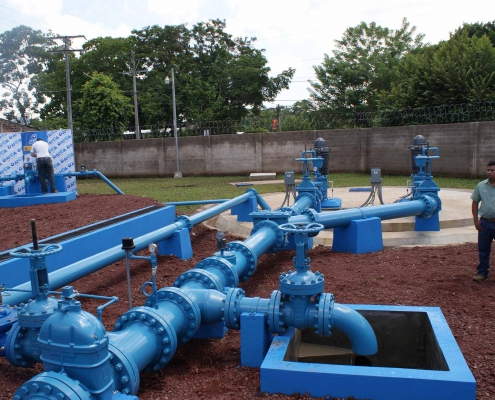El Salvador

With regards to drinking water and basic sanitation in the country, there is a significant deficit in coverage, quality, continuity, legal security and poor regulation. There is a real need for improved technical assistance. On the other hand, the strong impact of climate change on water resources is notable, especially in the dry corridor that extends to other countries in the area, the most critical situation being in rural areas of the country, with a significant gap in relation to urban areas.
The Water Fund has carried out a total of nine interventions in El Salvador for a total of 100 million euros, 74 million euros of which are donations from Spain.
By 2020, six programmes have been completed, two are under implementation and the financing agreement was recently signed for a new intervention, which is expected to start being implemented in the last quarter of 2021 after the programme documents have been drawn up. All programmes are aimed at improving governance and expanding water and sanitation service coverage in the country.
Currently, the Integrated Water, Sanitation and Environment Project (SLV-056-B) is underway and has been implemented almost in its entirety. Its activities focus both on improving the service and establishing drinking water and sanitation infrastructure and on institutional strengthening and governance of water resources.
Likewise, the programme Construction of Public Policy that Guarantees the Sustainability of the Drinking Water and Sanitation Subsector in the Rural Area of El Salvador, Phase I (SLV-059-B) is being implemented, the purpose of which is to contribute to the creation of the institutional framework for the rural drinking water and sanitation subsector, considering institutional collaboration, the regulatory framework and rules to strengthen the sustainability of water and sanitation services in these areas. It began to be implemented in June 2019 and interventions are being carried out in rural systems not managed by the National Administration of Aqueducts and Sewers (ANDA), both in infrastructure and environment for the protection and control of water resources and the strengthening of rural boards. It is estimated that it will improve access to drinking water for 60,000 people.
Finally, in December 2020, a new programme was approved for an amount of 600,000 euros, Construction of Public Policy to Ensure the Sustainability of the Drinking Water and Sanitation Subsector in the Rural Area of El Salvador, Phase II (SLV-060-B). It is expected to last three years and aims to extend the sustainable management of water and sanitation services with special emphasis on rural areas by strengthening both the rural systems not administered by ANDA, for the quality, sustainability, protection/conservation of water systems and sources, and the management and administration capacities of the executing institutions.
More information
Up until 2020, more than 200,000 people have benefited from the Water Facility’s programmes in El Salvador: 135,000 have gained access to safe drinking water and 125,000 have access to sanitation. More than 15,000 people have received training on hygiene or use of the resource. More than 60% of the beneficiaries of the bilateral programmes correspond to the SLV-001-B Programme, whose main objective was to improve drinking water and basic sanitation services in rural and peri-urban areas of the country.
We must highlight the good practices regarding gender mainstreaming in the water programmes being implemented, as the gender indicators developed for the impact analysis are relevant in terms of increasing women’s participation in decision-making spaces from a qualitative point of view.
It is also worth mentioning the success of the condominial sanitation project in El Salvador, which has been carried out thanks to the LAIF Regional programme funds delegated by the EU, and is currently being replicated in other countries. This is a form of intervention that reduces the costs of sanitary sewerage projects and encourages community participation. The cost of installing sewer pipes is reduced by 30% by passing through pavements and, only if necessary, through private property.
Complementary to the Fund’s interventions, also under the Regional LAIF, due to the COVID pandemic situation, in 2020 two grants were awarded in the country to address the crisis (see Annex 2 for details of action preparation):
- COVID-19 emergency response supporting drinking water systems in rural communities – ADES – El Salvador – 93,148 €.
- COVID-19 emergency response supporting drinking water systems in rural communities – PROVIDA – El Salvador – 119,773 €.

